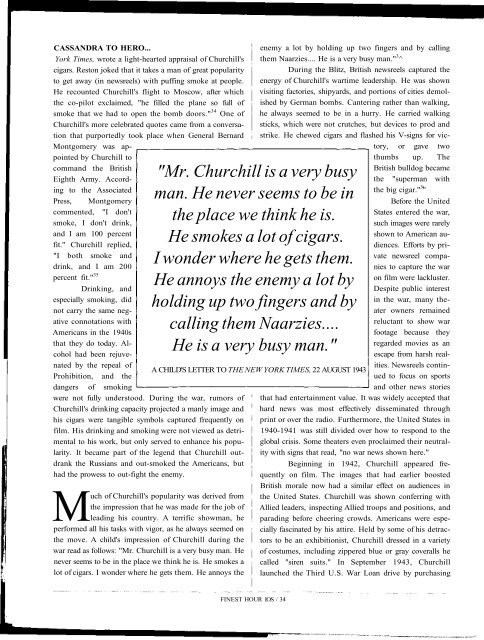journal of the churchill center and societies - Winston Churchill
journal of the churchill center and societies - Winston Churchill
journal of the churchill center and societies - Winston Churchill
- No tags were found...
You also want an ePaper? Increase the reach of your titles
YUMPU automatically turns print PDFs into web optimized ePapers that Google loves.
CASSANDRA TO HERO...<br />
York Times, wrote a light-hearted appraisal <strong>of</strong> <strong>Churchill</strong>'s<br />
cigars. Reston joked that it takes a man <strong>of</strong> great popularity<br />
to get away (in newsreels) with puffing smoke at people.<br />
He recounted <strong>Churchill</strong>'s flight to Moscow, after which<br />
<strong>the</strong> co-pilot exclaimed, "he filled <strong>the</strong> plane so full <strong>of</strong><br />
smoke that we had to open <strong>the</strong> bomb doors." 34 One <strong>of</strong><br />
<strong>Churchill</strong>'s more celebrated quotes came from a conversation<br />
that purportedly took place when General Bernard<br />
Montgomery was appointed<br />
by <strong>Churchill</strong> to<br />
comm<strong>and</strong> <strong>the</strong> British<br />
Eighth Army. According<br />
to <strong>the</strong> Associated<br />
Press, Montgomery<br />
commented, "I don't<br />
smoke, I don't drink,<br />
<strong>and</strong> I am 100 percent<br />
fit." <strong>Churchill</strong> replied,<br />
"I both smoke <strong>and</strong><br />
drink, <strong>and</strong> I am 200<br />
percent fit." 35<br />
Drinking, <strong>and</strong><br />
especially smoking, did<br />
not carry <strong>the</strong> same negative<br />
connotations with<br />
Americans in <strong>the</strong> 1940s<br />
that <strong>the</strong>y do today. Alcohol<br />
had been rejuvenated<br />
by <strong>the</strong> repeal <strong>of</strong><br />
Prohibition, <strong>and</strong> <strong>the</strong><br />
dangers <strong>of</strong> smoking<br />
were not fully understood. During <strong>the</strong> war, rumors <strong>of</strong><br />
<strong>Churchill</strong>'s drinking capacity projected a manly image <strong>and</strong><br />
his cigars were tangible symbols captured frequently on<br />
film. His drinking <strong>and</strong> smoking were not viewed as detrimental<br />
to his work, but only served to enhance his popularity.<br />
It became part <strong>of</strong> <strong>the</strong> legend that <strong>Churchill</strong> outdrank<br />
<strong>the</strong> Russians <strong>and</strong> out-smoked <strong>the</strong> Americans, but<br />
had <strong>the</strong> prowess to out-fight <strong>the</strong> enemy.<br />
Much <strong>of</strong> <strong>Churchill</strong>'s popularity was derived from<br />
<strong>the</strong> impression that he was made for <strong>the</strong> job <strong>of</strong><br />
leading his country. A terrific showman, he<br />
performed all his tasks with vigor, as he always seemed on<br />
<strong>the</strong> move. A child's impression <strong>of</strong> <strong>Churchill</strong> during <strong>the</strong><br />
war read as follows: "Mr. <strong>Churchill</strong> is a very busy man. He<br />
never seems to be in <strong>the</strong> place we think he is. He smokes a<br />
lot <strong>of</strong> cigars. I wonder where he gets <strong>the</strong>m. He annoys <strong>the</strong><br />
enemy a lot by holding up two fingers <strong>and</strong> by calling<br />
<strong>the</strong>m Naarzies.... He is a very busy man." 3^<br />
During <strong>the</strong> Blitz, British newsreels captured <strong>the</strong><br />
energy <strong>of</strong> <strong>Churchill</strong>'s wartime leadership. He was shown<br />
visiting factories, shipyards, <strong>and</strong> portions <strong>of</strong> cities demolished<br />
by German bombs. Cantering ra<strong>the</strong>r than walking,<br />
he always seemed to be in a hurry. He carried walking<br />
sticks, which were not crutches, but devices to prod <strong>and</strong><br />
strike. He chewed cigars <strong>and</strong> flashed his V-signs for victory,<br />
or gave two<br />
thumbs up. The<br />
"Mr. <strong>Churchill</strong> is a very busy<br />
man. He never seems to be in<br />
<strong>the</strong> place we think he is.<br />
He smokes a lot <strong>of</strong> cigars.<br />
I wonder where he gets <strong>the</strong>m.<br />
He annoys <strong>the</strong> enemy a lot by<br />
holding up two fingers <strong>and</strong> by<br />
calling <strong>the</strong>m Naarzies....<br />
He is a very busy man."<br />
A CHILD'S LETTER TO THE NEW YORK TIMES, 22 AUGUST 1943<br />
British bulldog became<br />
<strong>the</strong> "superman with<br />
<strong>the</strong> big cigar." 3 ''<br />
Before <strong>the</strong> United<br />
States entered <strong>the</strong> war,<br />
such images were rarely<br />
shown to American audiences.<br />
Efforts by private<br />
newsreel companies<br />
to capture <strong>the</strong> war<br />
on film were lackluster.<br />
Despite public interest<br />
in <strong>the</strong> war, many <strong>the</strong>ater<br />
owners remained<br />
reluctant to show war<br />
footage because <strong>the</strong>y<br />
regarded movies as an<br />
escape from harsh realities.<br />
Newsreels continued<br />
to focus on sports<br />
<strong>and</strong> o<strong>the</strong>r news stories<br />
that had entertainment value. It was widely accepted that<br />
hard news was most effectively disseminated through<br />
print or over <strong>the</strong> radio. Fur<strong>the</strong>rmore, <strong>the</strong> United States in<br />
1940-1941 was still divided over how to respond to <strong>the</strong><br />
global crisis. Some <strong>the</strong>aters even proclaimed <strong>the</strong>ir neutrality<br />
with signs that read, "no war news shown here."<br />
Beginning in 1942, <strong>Churchill</strong> appeared frequently<br />
on film. The images that had earlier boosted<br />
British morale now had a similar effect on audiences in<br />
<strong>the</strong> United States. <strong>Churchill</strong> was shown conferring with<br />
Allied leaders, inspecting Allied troops <strong>and</strong> positions, <strong>and</strong><br />
parading before cheering crowds. Americans were especially<br />
fascinated by his attire. Held by some <strong>of</strong> his detractors<br />
to be an exhibitionist, <strong>Churchill</strong> dressed in a variety<br />
<strong>of</strong> costumes, including zippered blue or gray coveralls he<br />
called "siren suits." In September 1943, <strong>Churchill</strong><br />
launched <strong>the</strong> Third U.S. War Loan drive by purchasing<br />
FINEST HOUR IOS / 34

















